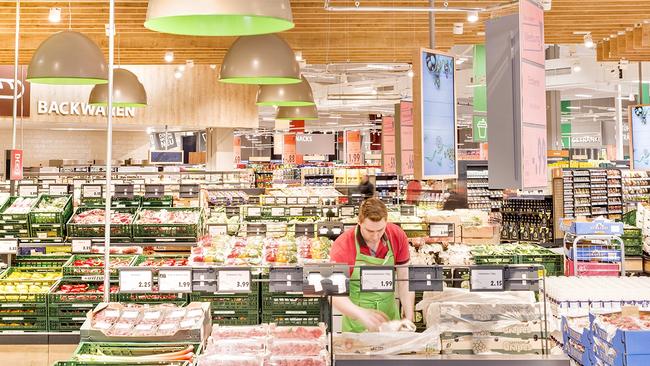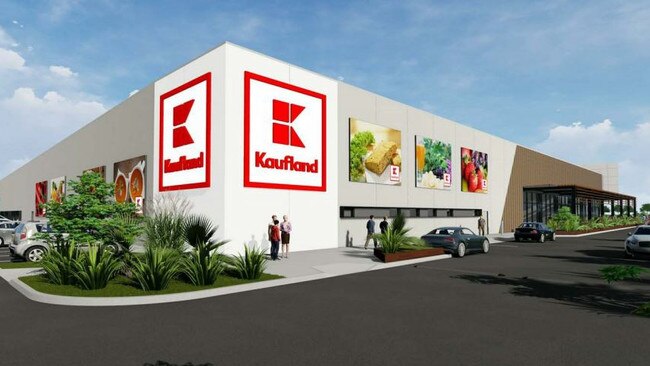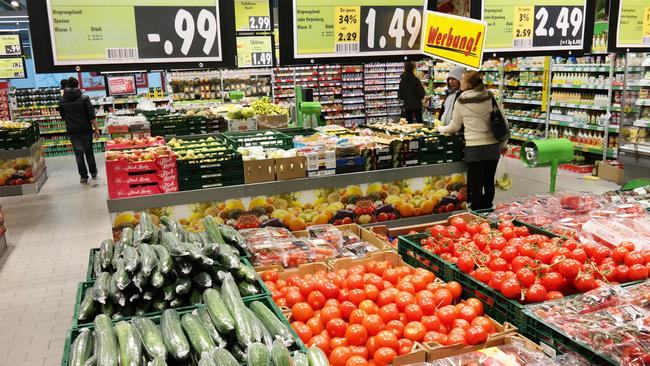Why German retailer Kaufland pulled out of Australia
Despite its promise to shake up the nation’s $110 billion supermarket sector, German retail giant Kaufland announced on Wednesday it would be pulling out of the Australian market. Here’s why.

Business
Don't miss out on the headlines from Business. Followed categories will be added to My News.
Trouble securing a steady supply of fresh food is likely to have played a role in Kaufland’s decision to pull out of the Australian market, a leading retail expert says.
The German grocery titan, which promised to shake up the nation’s $110 billion supermarket sector, has stunned the retail industry by announcing it will quit Australia without opening a single store.
It comes despite Kaufland pouring more than $500 million into its Australian arm.
The retailer had sought approval for at least 23 stores — which have been described as a cross between Aldi and Costco — in Victoria, New South Wales, South Australia and Queensland. Fourteen were slated for Victoria.

Kaufland had also started work on a major distribution warehouse at Mickleham, in Melbourne’s northern suburbs.
Queensland University of Technology retail expert Gary Mortimer said it was highly unusual for a major global retailer to invest so much in a market and then abruptly pull out.
“It’s a surprise,” Dr Mortimer told Business Daily.
“Certainly its highly unusual for a global retail brand to enter a market, identify at least 23 sites across the nation, recruit over 200 team members, set the ground work for a distribution centre only to pull out at a late stage.”
Dr Mortimer said while the local retail sector was challenged, a global retail giant such as Kaufland would have a long-term view and was well equipped to trade through the economic cycle.
Rather, its late withdrawal raised questions around whether Kaufland had struggled to secure enough fresh food suppliers for its massive stores, he said.
Kaufland outlets generally span 20,000 sqm — more than five times the average Coles or Woolworths — and sell 60,000 goods ranging from cheese slices to car tyres.
“I suspect there were challenges with supply of fresh,” Dr Mortimer said.
“Aldi has been successful but it has a smaller fresh offer. The Kaufland offer was a full supermarket model with a very extensive fresh offer and there are challenges in accessing that type of inventory.”
Retail Doctor Group founder Brian Walker said Kaufland would have needed at least 50 stores to get any kind of scale in Australia.

It was simply not willing to make that kind of investment given its European business was coming under pressure, Mr Walker said. “The supermarket sector in Europe is not immune to what has been going on locally,” he said.
Kaufland International chief Frank Schumann said the decision to leave Australia had been made after “careful and thorough consideration”.
The retailer’s 200 Australian employees were told of the decision on yesterday. All employee entitlements would be paid, Kaufland said.
Kaufland is part of the Schwarz Group, the fourth biggest retailer in the world, which also owns discount grocery chain Lidl. Schwarz underwent a management reshuffle last year and the rollout of the Lidl chain in the US has come under pressure.
Kaufland’s withdrawal is a blow for the Victorian government, which had rolled out the welcome mat for the German retailer.
Its Australian arm was headquartered in Melbourne — a gain for the city, which had missed out to Sydney on securing Aldi’s head office.
Kaufland had pledged to spend $500 million in Victoria on its store network and distribution centre.
The state government had said the investment would generate 1500 new jobs.
While its withdrawal adds to the pall over the retail sector, supermarket rivals Coles, Woolworths, Metcash — the company that supplies Independent Grocers of Australia — and Aldi will be breathing a sigh of relief.
Kaufland snapped up its first Australian site in Adelaide in 2017 and had been expected to open its first store early next year.
Company records show Kaufland had pumped more than $500 million into its Australian arm, which generated a loss of $4.8 million for the year to February 2018.
